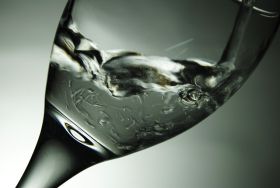
Are you wondering; how much water should I drink a day? Well there's actually not an easy answer to how much water to drink a day to stay hydrated. It really depends. Some common variants it depends on include things like:
- How much you exercise.
- How hot and humid or dry your climate is.
- What altitude you live at.
- If you have an illness of some sort.Your weight.
- If you are pregnant.
- If you are breastfeeding.
- How much alcohol you drink.
- How much caffeine you drink.
Because of all these variants it's hard to know for everyone how much water to drink. But there is a nifty water calculator at this site: nutrition.about.com/library/blwatercalculator.htm.
And here is some information published by the Mayo Clinic* that could be useful:
How much water do you need?
Every day you lose water through your breath, perspiration, urine and bowel movements. For your body to function properly, you must replenish its water supply by consuming beverages and foods that contain water.
So how much fluid does the average, healthy adult living in a temperate climate need? The Institute of Medicine determined that an adequate intake (AI) for men is roughly 3 liters (about 13 cups) of total beverages a day. The AI for women is 2.2 liters (about 9 cups) of total beverages a day.
What about the advice to drink eight glasses a day?
Everyone has heard the advice, "Drink eight once glasses of water a day." That's about 1.9 liters, which isn't that different from the Institute of Medicine recommendations. Although the "8 by 8" rule isn't supported by hard evidence, it remains popular because it's easy to remember. Just keep in mind that the rule should be reframed as: "Drink at least eight ounce glasses of fluid a day," because all fluids count toward the daily total.
One good measure to know if you are staying hydrated is to look at your urine. If it is colorless or a lighter yellow then your fluid intake is probably adequate.
Though is is generally uncommon, there is the possibility of drinking too much water. This is called hyponatremia and it's when your kidneys can't excrete excess water and the electrolyte content of the blood gets diluted so the amount of sodium in fluids outside cells drops. Water then moves into the cells to balance the levels. This causes the cells to swell with too much water. Although most cells can handle this swelling, brain cells cannot, because the skull bones confine them. Brain swelling causes most of the symptoms of hyponatremia. The people who are at highest risk are endurance athletes who dirnk large amounts of water.
A great way to stay hydrated is not only to drink the proper amount of water but to drink the best water for good hydration like Structured Water from a Structured Water Unit which is going to be easier for the body to absorb.
Hopefully this helped answer your question; how much water should I drink a day?
*http://www.mayoclinic.com/health/water/NU00283
To learn more about Natural Action Structured Water Units, please visit our Store.

 Twitter
Twitter Facebook
Facebook RSS
RSS Call 928-202-9155
Call 928-202-9155

